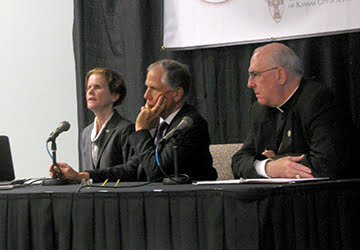
LEAVEN PHOTO BY SHEILA MYERS Following a presentation about the Health and Human Services preventive care mandate, there was a panel discussion with, from left, Karen McLeese, J.D.; John Haas, Ph.D., STL, president of the National Catholic Bioethics Center in Philadelphia; and Archbishop Joseph F. Naumann.
Businesspeople seek guidance on the mandate’s demands
by Sheila Myers
Special to The Leaven
OVERLAND PARK — Catholic businessmen and women have few morally acceptable options if they wish to comply with the HHS preventive care mandate taking effect in the coming months.
That was the message delivered at a presentation Oct. 24 sponsored by the archdiocese and the Heart of America Catholic Business Network (CBN) at the Overland Park Convention Center.
The presentation was a response to inquiries by area businesspeople seeking guidance on how to reconcile their religious convictions with the demands of the mandate.
“There’s never been a time when we’re facing such direct challenges in our own world and our own venues,” said Dan Spencer, co-founder and executive director of CBN. “It’s important we answer correctly and as Catholics, not in some generic measure.”
A moral dilemma
Archbishop Joseph Naumann, Dr. John Haas, president of the National Catholic Bioethics Center, and Karen McCleese, a lawyer and vice president of regulatory affairs for CBIZ, a Kansas City employee benefits specialist, laid out the ethical and legal landscape and took questions from the audience of about 200.
The mandate, part of the Affordable Care Act (ACA) passed by Congress in March 2010, requires insurance policies to cover preventive health services. HHS has defined preventive services for women to include contraceptives, abortion-inducing drugs and sterilization, all considered intrinsic evils by the Catholic Church.
While religious employers have a “safe harbor” year postponing compliance until Aug. 1, 2013, secular employers have no religious exemption, regardless of their conscientious objections.
“They now, by law, must provide this coverage or face crippling penalties,” Haas said.
Failure to include preventive care coverage can result in a fine of $100 per day per employee, amounting to $500,000 a year for a business with 15 full-time employees.
Options and opportunities
Absent relief from the election or in the courts, non-grandfathered secular employers have the following options:
1. Willingly assent. Comply with the provision of the morally objectionable insurance coverage.
2. Provide morally nonobjectionable insurance. Provide an insurance plan that excludes preventive care. Such policies will be virtually impossible to find and self-insurers who do so will face huge penalties.
3. Drop coverage. Employers will incur significant penalties. It also forces employees into plans that provide preventive coverage.
4. Temporarily comply under protest. Pursue legal avenues to eliminate the burden on the free exercise of religion and/or tolerate a group health plan that covers preventive care until January 2014, when employees in every state can join affordable insurance exchanges. However, these exchanges will include preventive coverage.
“There are no black-and-white answers, but there are opportunities,” McCleese said.
Hopeful signs
Recent rulings in federal district courts indicate the issue will make its way to the Supreme Court. Once it reaches there, both Haas and McCleese believe it will move forward.
McCleese believes the Supreme Court will take the case based on a challenge to the Religious Freedom Restoration Act, a 1993 U.S. federal law aimed at preventing laws that substantially burden the free exercise of religion.
“For the federal government to impinge on the rights of individuals or employers, there must be a compelling reason to do it,” McCleese said. “The next question becomes: ‘Is the methodology the least restrictive way to do it?’ If the answer is no, then the law fails.”
Haas sees encouraging signs in majority opinions written by Chief Justice John Roberts and Justice Ruth Bader Ginsberg in the court’s June ruling upholding the ACA’s individual mandate. Both justices wrote that, while the individual mandate is constitutional under Congress’ taxing power, no tax can be allowed to abridge constitutional freedoms.
“I think there are indications that if this makes its way all the way to the Supreme Court, we have some hope that we would prevail,” Haas said.






